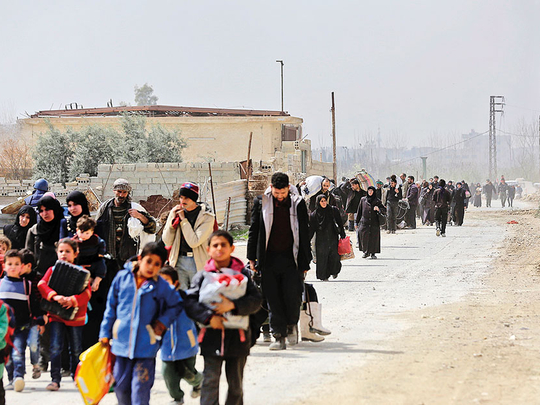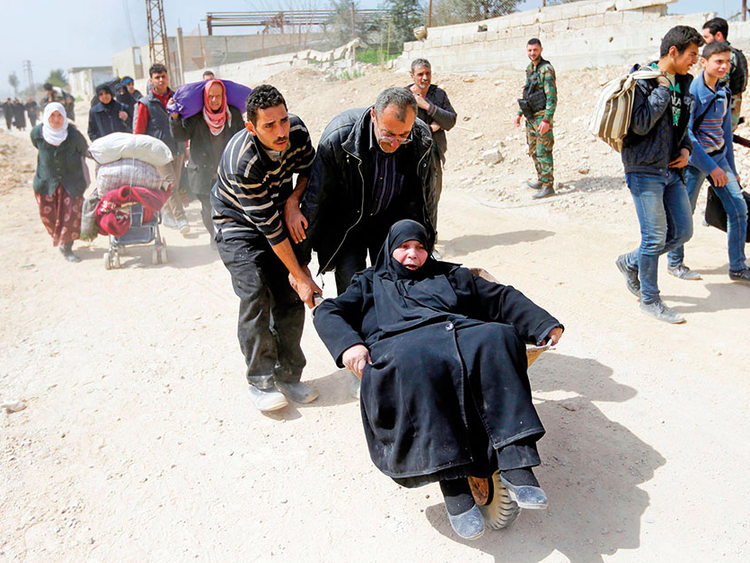
Adra, Syria: Thousands of civilians poured out of rebel-held Eastern Ghouta on Thursday, bringing the Syrian regime closer to retaking the battered enclave outside Damascus as the brutal war entered its eighth year.
Defying calls to step down since 2011, Syria’s President Bashar Al Assad has maintained his grip on power and is now pursuing a ferocious assault against the last opposition bastion near the capital.
The onslaught has split Ghouta into three with desperate residents in one zone receiving food aid on Thursday as thousands fled another.
Streams of women and children escaped a southern pocket of Ghouta into government-controlled territory on Thursday, AFP correspondents on both sides of the battlefront said.
Many were on foot, carrying plastic bags stuffed with clothes and pushing strollers piled high with suitcases and rugs.
They reached a regime-held checkpoint in the region of Adra, where ambulances and a group of large green buses were waiting to take them to temporary shelters.
The Syrian Observatory for Human Rights said more than 12,000 people fled the enclave on Thursday in “the largest displacement since the beginning of the assault on Ghouta.”
The exodus came after regime forces advanced overnight, seizing the eastern half of the key town of Hammuriyeh, the Britain-based war monitor said.
Regime forces rained air strikes and barrel bombs down on Hammuriyeh, and eventually opened up a corridor through the town into government-controlled territory.
The Russian military, which has backed the offensive on the rebel enclave, said as many as 13,000 people could leave the enclave by the end of the day.
Eastern Ghouta had been the main rebel bastion on the outskirts of Damascus since 2012 and came under a devastating regime siege the following year.
That left the area’s roughly 400,000 residents struggling to secure food and hospitals crippled by shortages of medicine and equipment.
On Thursday, a joint convoy of food supplies for some 26,000 people entered Douma, the largest town in Ghouta and part of a separate rebel-controlled pocket.
“This is just a little of what these families need,” said the International Committee of the Red Cross, which was carrying out the delivery alongside the Syrian Arab Red Crescent and the United Nations.
ICRC President Peter Maurer was present with the convoy, the first time he had accompanied such an operation.
Twenty-five trucks were delivering food parcels and flour bags to hunger-stricken residents in Douma when mortar rounds hit nearby.
Aid workers were sent scrambling for cover, an AFP correspondent said, but were able to resume delivery shortly afterwards.
Thursday’s aid operation came after two consecutive days of medical evacuations from Douma, which saw dozens of civilians bussed out to receive treatment in Damascus.
Eastern Ghouta was designated in May 2017 as a “de-escalation zone” - an area where violence is supposed to be reduced to pave the way for humanitarian assistance and a nationwide truce.
But since February 18, Russian-backed government troops have pressed a ferocious air and ground campaign in Ghouta that has brought more than 60 per cent of the one-time opposition bastion under government control.
The remaining parts have been cut off from each other, in what analyst Nawar Oliver said was part of a divide-and-conquer strategy.
“The summary is that the regime cut up Ghouta into three zones, to comfortably work on securing three different agreements,” said Oliver of the Turkey-based Omran Institute.
Al Assad is determined to retake Ghouta in order to secure the capital, which is regularly battered by rockets and mortars fired from the adjacent rebel enclave.
Dozens in Damascus have been killed in rebel fire in recent weeks, including one person killed Thursday, according to state news agency SANA.
The assault on Ghouta, meanwhile, has left nearly 1,250 civilians dead, around a fifth of them children.
The United Nations has made repeated demands for an immediate ceasefire in Eastern Ghouta, but they have gone unheeded.
For the past seven years, international efforts to bring an end to the violence raging across Syria have consistently failed.
The conflict has drawn in world powers, with Russia backing Al Assad and Turkey supporting an array of rebels in Syria’s north against the regime, Islamist militants, and Kurds.
Ankara and allied Syrian factions have since January 20 been waging a deadly ground and air assault against the Kurdish-controlled enclave of Afrin in northwest Syria.
They have seized more than 70 per cent of that region, according to the Observatory, and are on the verge of surrounding Afrin city, home to around 350,000 people and defended by the Kurdish People’s Protection Units (YPG).












